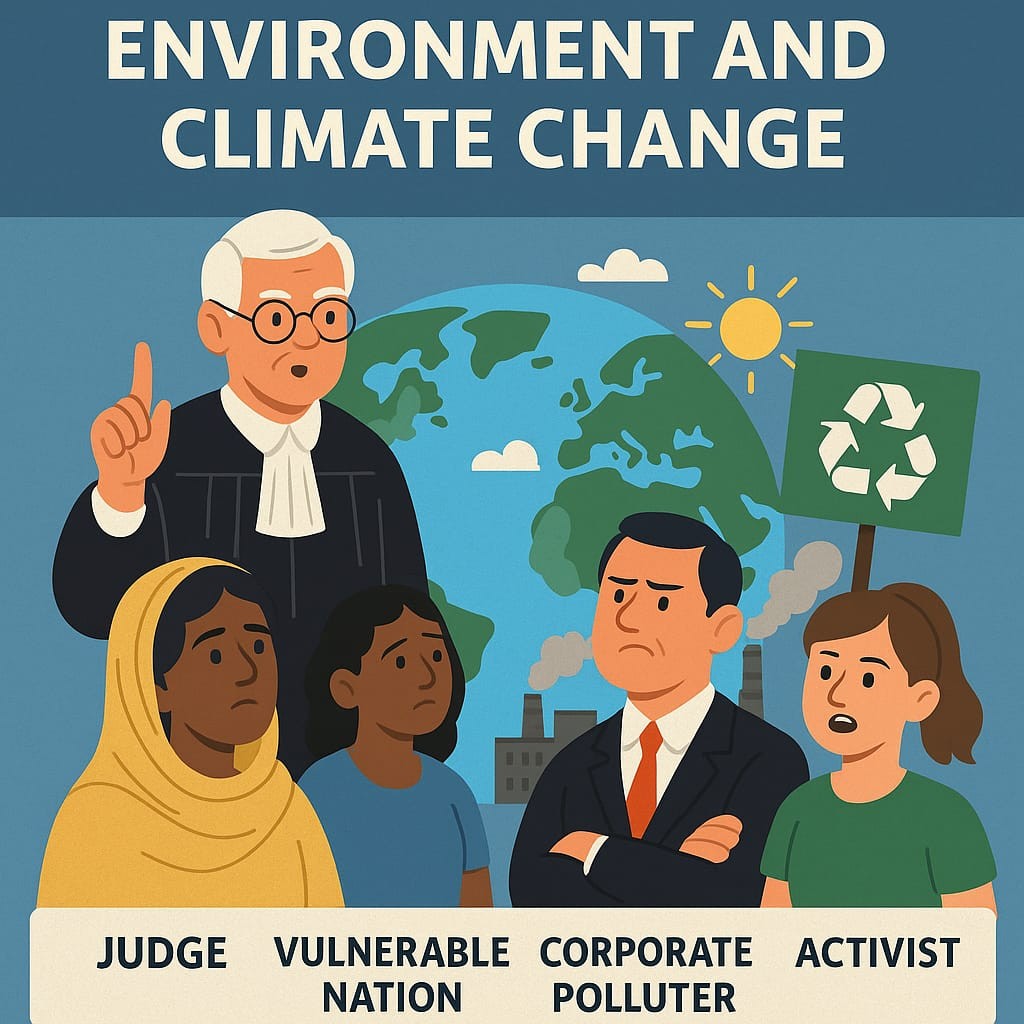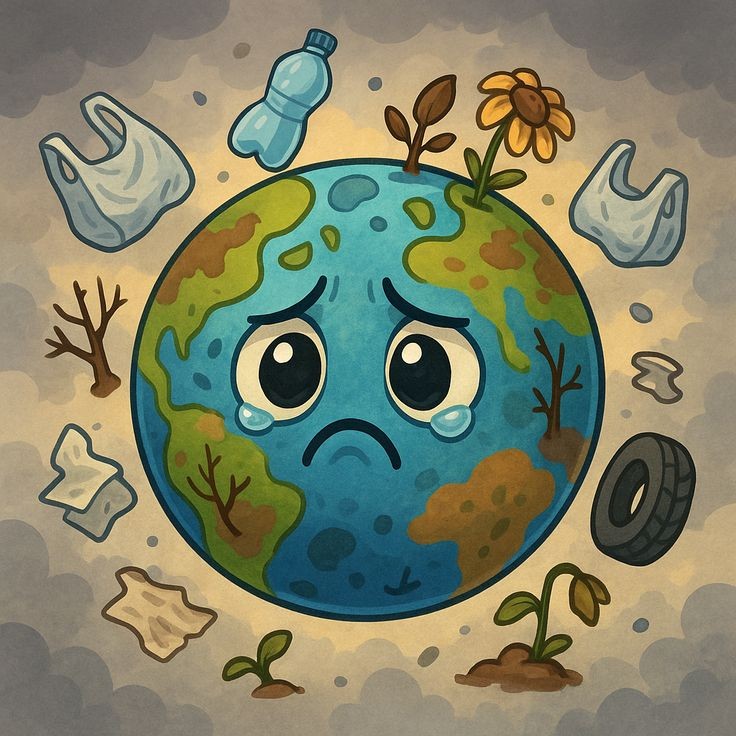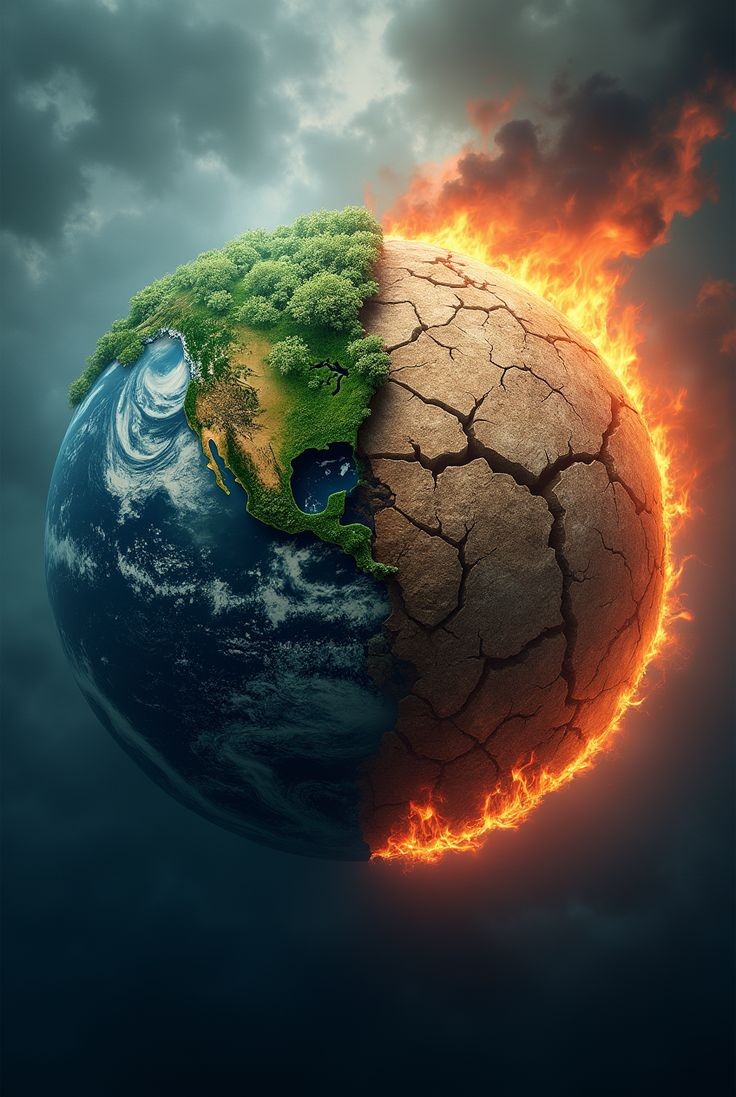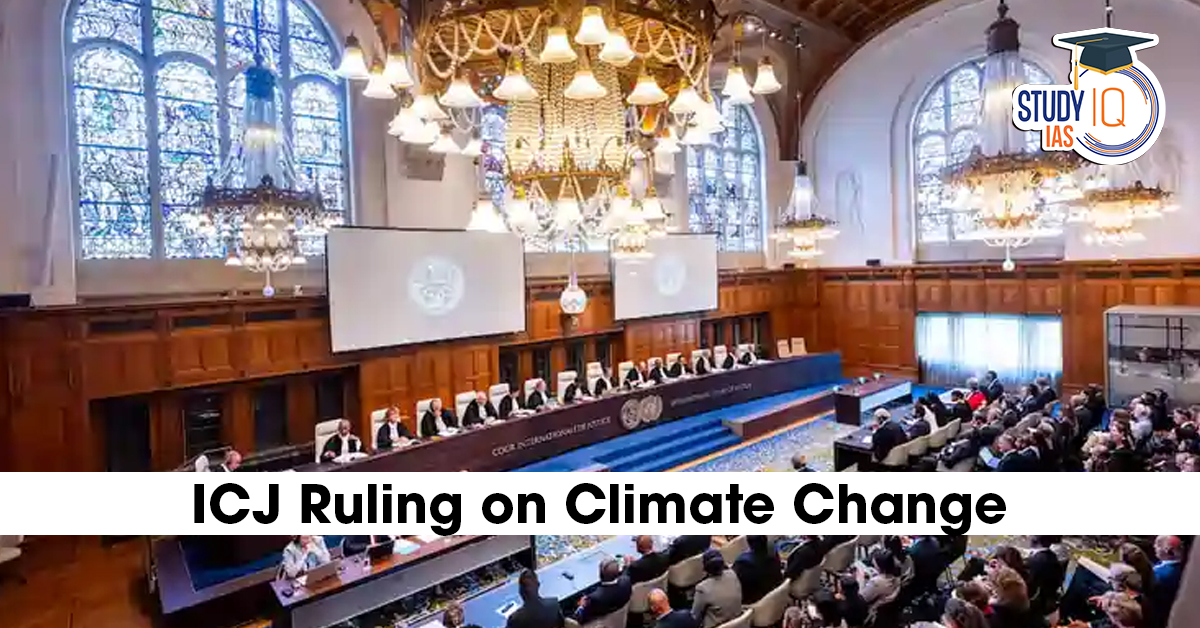Table of Contents
Climate change has become one of the most urgent concerns of the 21st century, affecting ecosystems, the economy, and human rights worldwide. The International Court of Justice (ICJ) has issued an advisory judgment that significantly redefines climate action as a legal obligation under international law rather than merely a policy necessity. This decision may transform global climate governance, trigger a surge in climate lawsuits, and hold nations and companies accountable for their insufficient climate action. The ICJ’s opinion, albeit non-binding, holds significant authority as the foremost legal guideline on state obligations pertaining to climate change.
Background of the ICJ Case on Climate Change
- The ICJ’s advisory opinion originated from a resolution adopted by the UN General Assembly in March 2022, mostly prompted by small island developing states and nations susceptible to climate change.
- These nations, although their contributions to global emissions are negligible, endure disproportionate consequences of climate change, such as elevated sea levels, severe weather phenomena, and biodiversity loss.

- The UNGA requested elucidation on two principal legal inquiries:
-
- State Obligations: What responsibilities do nations have under international law to safeguard the climate system from anthropogenic greenhouse gas emissions?
- Legal Implications: What liabilities are incurred by nations that do not fulfil these obligations?
- This proposal underscored the necessity for climate justice, a notion that promotes equity and accountability in the allocation of climate responsibilities and the redress of harm experienced by marginalised communities.
- Advocates promptly lauded the International Court of Justice’s opinion regarding governments’ responsibilities to address climate change and the repercussions they may encounter for non-compliance.
- “Failure of a state to take appropriate action to protect the climate system … may constitute an internationally wrongful act,” stated court President Yuji Iwasawa during the hearing.
- He described the climate disaster as “an existential problem of planetary proportions that imperils all forms of life and the very health of our planet.”
- The non-binding opinion, unanimously supported by the court’s 15 justices, was regarded as a pivotal moment in international climate law.
- The court affirmed that a “clean, healthy, and sustainable environment“ constitutes a human right.
- This facilitates other legal proceedings, including governments revisiting the ICJ for mutual accountability, domestic lawsuits, and legal mechanisms like as investment agreements.
- The initiative was spearheaded by the Pacific island nation of Vanuatu and supported by over 130 nations.
- All U.N. member states, including significant greenhouse gas emitters such as the United States and China, are signatories to the court.
- Climate activists assembled outside the packed courthouse, displaying a sign that stated: “Courts have spoken.”
- The legislation is clear. States must take immediate action. They saw the verdict on a large screen, applauding and exulting intermittently throughout the two-hour session. Upon its conclusion, others exited the courtroom, laughing and embracing.
- “Today, the tables have turned.” Mary Robinson, former U.N. human rights head, stated, “The world’s highest court has equipped us with a formidable new instrument to safeguard individuals from the catastrophic effects of the climate crisis and to ensure justice for the damage already inflicted by their emissions.”
- The ICJ’s ruling advances the prospect of a world in which governments may no longer disregard their legal obligations. Vishal Prasad, director of Pacific Islands Students Fighting Climate Change, stated, “It asserts a fundamental principle of climate justice: Those who contributed least to this crisis merit protection, reparations, and a future.”
The ICJ Ruling and Identified Obligations
- The ICJ analysed various international legal mechanisms that influence global climate governance.
- 1994 UN Framework Convention on Climate Change (UNFCCC) – providing a framework for the stabilisation of greenhouse gases.
- The 1997 Kyoto Protocol established legally binding targets for developed nations.
- The 2015 Paris Agreement seeks to restrict the increase in global temperature to between 1.5 and 2 degrees Celsius.
- Supplementary treaties encompass the UN Convention on the Law of the Sea (UNCLOS), the Montreal Protocol (1987), the Convention on Biological Diversity (1992), and the Convention to Combat Desertification (1994).
The court determined that:
- Climate action constitutes a legal requirement rather than a discretionary decision.
- Developed countries (Annexure I nations) must spearhead emissions reduction and facilitate technology and financial transfers to underdeveloped countries.
- Inaction represents an internationally wrongful act, incurring potential accountability for complete compensation to “injured states” experiencing climate-related harm.
- States bear responsibility not only for their conduct but also for the negligent behaviour of private firms if they inadequately control them.
- The decision firmly supports the principle of loss and damage, acknowledging the entitlement of impacted nations to pursue compensation for climate-related injuries.
Significance of the Ruling in International Climate Governance
Despite advisory opinions lacking legal binding authority, the ICJ’s interpretation carries considerable significance due to:
- Authoritative Legal Guidance: It provides the most reliable interpretation of international law regarding climate change, impacting future judicial rulings worldwide.
- Prospects for Climate Litigation: Nations and corporations may encounter legal actions for failure to address climate issues, encompassing requests for compensation.
- Accountability of Developed Nations: Historically, affluent nations have evaded repercussions for non-compliance with the Kyoto Protocol or for withdrawing from the Paris Agreement (e.g., the United States). This verdict may alter the situation by reinforcing assertions of legal culpability.
- Examination of Climate Initiatives: The court observed that superficial measures are inadequate; the magnitude and sufficiency of actions may be contested in judicial settings.
- Recognition of “Injured States”: Vulnerable states now possess enhanced legal foundations to seek damages for climate-induced calamities.
- This breakthrough might profoundly transform the global climate dialogue from voluntary commitments to binding legal obligations.

Linking the ICJ Ruling with Indian Environmental Law
- India, being a highly climate-vulnerable and fast-expanding nation, plays a pivotal role in international climate negotiations.
- The ICJ verdict is consistent with other ideas already integrated into Indian environmental jurisprudence, including:
- Article 21 – Right to Life: Interpreted by Indian courts to encompass the right to a clean and healthy environment (Subhash Kumar v. State of Bihar, 1991).
- The Polluter Pays Principle, established in Vellore Citizens Welfare Forum v. Union of India (1996), mandates that industries bear financial responsibility for environmental harm.
- The Public Trust Doctrine posits that the state serves as a trustee of natural resources for public utilisation.
- The Precautionary Principle asserts that courts have determined that the absence of scientific certainty does not justify inaction (MC Mehta v. Union of India, 1997).
- India is a signatory to the UNFCCC, Kyoto Protocol, and Paris Agreement, and possesses domestic legislation such as the Environment (Protection) Act of 1986 and the National Green Tribunal Act of 2010 to implement environmental standards.
- The ICJ verdict may enhance India’s capacity to request technological transfers and climate funding from developed countries, while simultaneously advocating for more robust domestic climate initiatives.
Recent Developments in Environmental Protection
- Globally and in India, environmental protection has gained increased momentum:
International Level
- The UN General Assembly (2022) recognised the right to a clean, healthy, and sustainable environment as a universal human right.
- Efforts to establish a binding Global Plastics Treaty and advancements in climate finance under COP27 and COP28 are notable.
Indian Context
- The Net Zero target by 2070 was announced at COP26.
- Expanded use of renewable energy, with ambitious solar energy targets.
- Supreme Court interventions have halted deforestation and imposed strict penalties for environmental violations.
- Strengthening of the National Green Tribunal (NGT) as a specialised body for environmental adjudication.
- However, challenges persist due to industrial lobbying, inadequate enforcement mechanisms, and a lack of stringent liability for corporate polluters.

Role of the Judiciary in Environmental Governance
- The Indian judiciary has traditionally had an active role in safeguarding the environment.
- Public Interest Litigations (PILs): Pivotal cases such as MC Mehta v. Union of India resulted in substantial reforms, notably the implementation of CNG in Delhi to mitigate air pollution.
- Expansion of Article 21: Acknowledging environmental rights as intrinsic rights.
- Mandates to Governments: Judicial bodies have mandated authorities to regulate polluting industries, safeguard forests, and mitigate climate risks.
- The ICJ verdict underscores the legal obligation to hold states and companies accountable for climate damage, under India’s constitutional principles of environmental protection as articulated in Articles 48A and 51A(g).
Way forward
- The ICJ’s advisory opinion on climate change signifies a pivotal point in international environmental law, converting climate action from discretionary political commitments to binding legal responsibilities.
- It fortifies the stance of vulnerable states, creates opportunities for climate litigation, and bolsters the notion of loss and harm within global climate dialogue.
- The opinion reinforces India’s constitutional guarantees, established environmental standards, and judicial activism focused on preserving natural equilibrium.
- This opinion, albeit non-binding, may establish a basis for a future binding international legal framework on climate change, rendering nations and corporations legally accountable for their environmental impact.
- The coming years will determine if this pivotal opinion creates genuine accountability or remains a mere aspirational benchmark in the battle against climate change.


 Warring Couples Cannot Make Courts Their...
Warring Couples Cannot Make Courts Their...
 Tackling Child Trafficking in India: Leg...
Tackling Child Trafficking in India: Leg...
 In Overcrowded Prisons, Justice Has Lost...
In Overcrowded Prisons, Justice Has Lost...



















